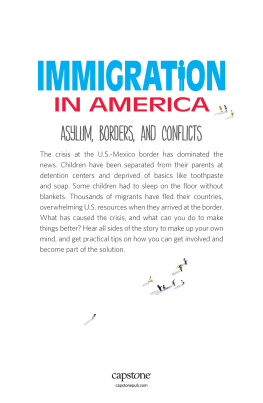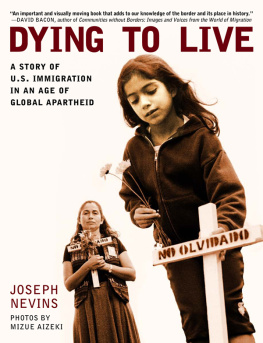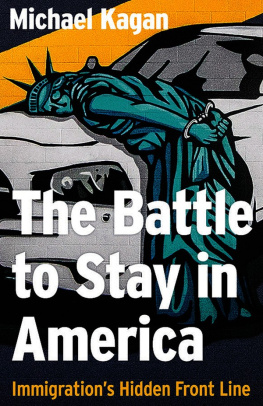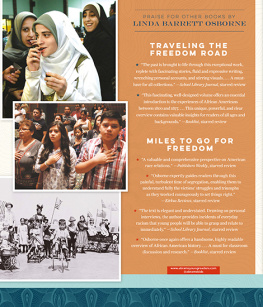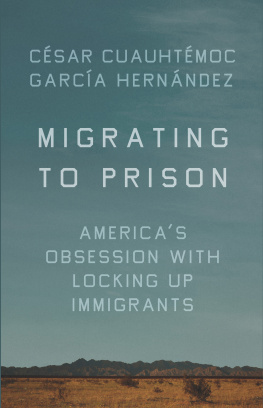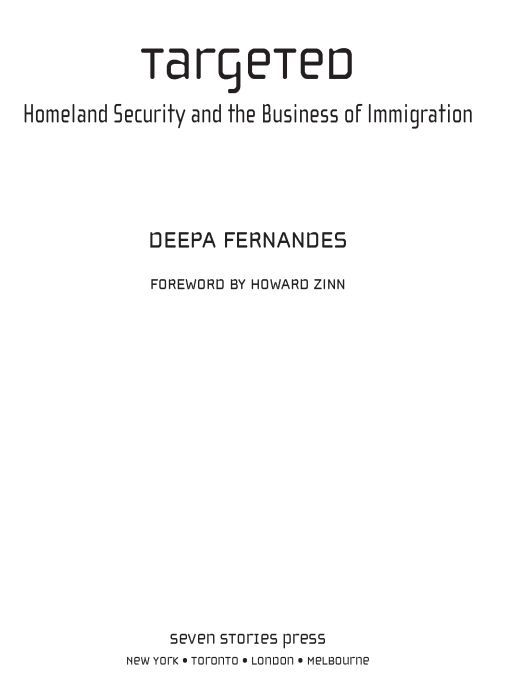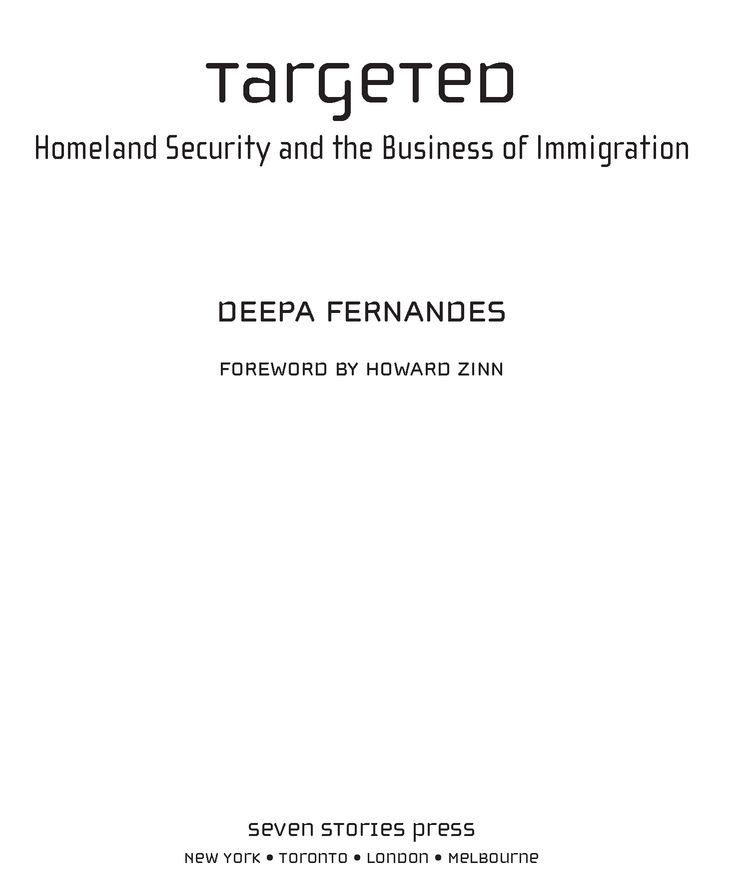Table of Contents
In Targeted, Deepa Fernandes exposes the immigration-industrial complex. She follows the money of the DHS-funded companies that profit, and tells the stories of the immigrants who ultimately pay. This well-researched book documents the perfect storm of white nationalist policy, corporate greed, and the privatized war on terror. As an immigrant herself twice-over, Fernandes writes movingly about the experiences of brown people in white countries, and shows that when anyone is diminished, we all lose.
Amy Goodman, host of Democracy Now!
Targeted lays bare the complex struggle for human rights that have no borders. With haunting personal stories, Deepa Fernandes deftly guides the reader through the hidden and fascinating debate that captivates our nation.
Dalia Hashad, USA Program Director, Amnesty International
Deepa Fernandes has written a truly brilliant book. She goes to the heart of current U.S. immigration policya policy centered on criminalizing and policing black and brown bodies. But just as superexploited immigrant labor has beenand continues to bethe source of huge profits for U.S. capital, now the repressive apparatus created to police the border and those who cross over has become the latest capitalist dream. If we really want immigration policies geared toward social justice, we must read this book.
Robin D. G. Kelley, author of Freedom Dreams: The Black Radical Imagination
Immigrants are dying for jobs.... Hundreds suffocate every year in the Arizona desert. Recycled Halliburton air strips make up the wall. Thats the bottom line few recognize like Deepa Fernandes. She portrays not only the human dimension, but how an immigration-industrial complex profits at all our expense.
Tom Hayden, former California delegate to the U.S.-Mexico Border Commission
Many people talk about the immigration system and those that benefit from it. But most immigrant rights organizers are frustrated by how many people underestimate the size and the significance of the current enforcement system. In the past decade over 1.5 million people have been deported, thousands have died at the border, and scores of families have been torn apart. At the same times prison corporations, county jails, and private phone companies see immigrants as a fresh source of income. Deepa Fernandes Targeted paints a picture that helps us understand just why we have to commit ourselves to the fight of our lives.
Subhash Kateel, Families for Freedom
Deepa Fernandes has created a powerful text of stories, interviews, research, and facts to dramatize the inanity of a war the United States government is waging against the immigrant poor in the guise of fighting terrorism. Economic realities are forcing people to leave their homes for an uncertain, exploitative, and often deadly journey to this country. Targeted is a much-needed sobering look at what is really going on in the midst of anti-immigrant hysterics and jingoism emanating from the halls of Congress to the desert borderlands.
Luis J. Rodriguez, author of Always Running: La Vida Loca: Gang Days in L.A.
The most comprehensive book on post-9/11 attack on immigrants in the U.S. From the desert sands of the U.S.-Mexican border to detention centers in NYC, and from the decades old writings of right wing ideologues to the draconian anti immigrant legislations of the last few years, Fernandes has woven together an in depth story of the current state of U.S. immigration policy; its origins, its arbitrariness, its contradictions, and its ineffectiveness. If you wish to understand contemporary America, this book is a must read.
Biju Mathew, author of Taxi!: Cabs and Capitalism in New York City
Deepa Fernandes extensive and serious research about immigration policies, homeland security business and the elites that profit from both, offers solid information and facts in contrast with the constant flow of prejudice, misinformation and outright lies that seem to frame the debate in our current talk show culture.
Pancho Argelles. co-author of BRIDGE: Building a Race and Immigration Dialogue in the Global Economy
To Abba John, my gentle and patient grandfather, who lived and died with the fear of being deported from Australia when all he wanted to do was live his later years close to his children and grandchildren.
To Nana Teresa, my loving and generous grandmother.May your wish to acquire permanent residence status, after eleven yearsof waiting in the queue, be granted soon.
ACKNOWLEDGMENTS
This book is the product of the genius of my very dearest friend Greg Ruggiero. Back when nobody was talking about immigration, when few cared enough to even commission an article on it, Greg wanted this story told. I am blessed that he has been with me as my editor and friend at every stage of this process. For his love and enthusiastic encouragement, this book owes him a great debt.
Many thanks to the crew at Seven StoriesDan, Ria, Ruth, Crystal, and especially Theresafor their valuable input and advice as this daily news journalist tackled her first book.
Sincere thanks to Jessica Silver-Greenberg and Nell Abram, my dedicated and probing research assistants, who managed to dig up many incredible pieces of information without which this book would be much less.
Mil gracias to my congressional advisor, researcher, and dear friend Mitch Jeserich of Pacifica Radio. Mitchs daily reporting for Free Speech Radio News from Capitol Hill was nothing short of exceptional, and I am thankful for his patience and help as I navigated the complex world of bills, acts, and subcommittees.
This has been, especially in the final haul, a collaborative effort. While the end product is mine, and I take full responsibility for any errors within, critical groundwork and research were contributed by Ting Ting Cheng, Nell Geiser, Pratap Chatterjee, Eddy Becker, Tricia Wang, and Monica Lpez.
Heartfelt thanks to those who gave up so much time to read drafts of this book and give me valuable feedback: Joe Fernandes, Mike Walsh, Matt Rogers, Biju Mathew, Nell Abram, Jee Kim, Benita Jain, and Aaron Hanna.
To the immigration attorneys who gave me countless hours of their time, especially Benita Jain. Also to Jack Wallace, Traci Hong, Marc Seitles, Marisa Dersey, Heather Rogers, Steven Forester, and Ira Kurzban.
And then there are the folks who live these issues every single day and whose work forms the basis of this book: Subhash Kateel, Adem Carroll, Bobby Khan, Biju Mathew, Karla Quionez, Vijay Prasad, Benita Jain, Kat Rodriguez, Michelle Karshan, Aarti Shahani, Eric Tang, and Monami Maulik. Your wisdom, thinking, and years of community-organizing work around immigrant issues has been so critical.
To my Haiti confidantes and travel buddies Kody Emmanuel and Sacajawea Hall. Thanks for showing me your Haiti and helping me learn your history. And to my dear friend Errol Maitland, thank you for teaching me so much and for being, as the inmates of Prison Civile so aptly named you, our Papa Noel. The mangoes were good. Lets go back soon.


